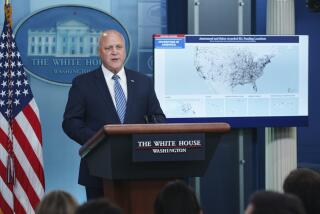TECHNOLOGY : Alaskans to Use SLED on Information Highway
- Share via
JUNEAU — Alaska is so vast and parts of it are so isolated that many residents spend most of their lives cut off from the rest of the world. But the state has taken extraordinary measures to bring the world to their doorsteps via an on-line communication network that is free to every Alaskan with a computer and a modem.
In time, every public library in Alaska will have a computer to serve the needs of those who do not own one, thus making the largest state in the Union a bit smaller through modern technology.
Computers are already in surprisingly wide use in the state. Nearly every desk in the high school of the oil-rich, isolated community of Barrow has a computer on it, making classrooms look more like research centers. It is on that tradition that state information specialists hope to build.
For now, the network offers primarily library and government reference materials, but it is expected to grow as more services are offered.
The network, called the Statewide Library Electronic Doorway, or SLED, ties in to the Internet, that great cloud of information networks that spans the globe. It grew largely out of recognition by state librarians that if they fail to keep up with advances in the Information Age, they may be left out in the cold.
“If libraries don’t get into this, other people will step in and do it,” said Steve Smith of the Rasmuson Library at the University of Alaska in Fairbanks, one of the creators of the network. Smith and others did not want to see their primary function--providing information--pass into the hands of commercial computer networks, leaving librarians as custodians of book warehouses.
He added: “We expect it to grow quite a bit” as more government agencies and private corporations join the network.
The network is similar to programs now being developed for California that will allow residents to tap into medical research and check the status of bills in the state Legislature.
But it could be particularly important for Alaskans who feel cut off from the outside world.
“For the first time, we are going to really start giving access (to information) to some of the rural areas,” said Karen Crane, director of the Alaska State Library system. She said she also expects the network to help rural Alaskans have more of an impact on the state decision-making process.
That latter goal is critical, because most of the vast resources that Alaska hopes to exploit in the coming decades are in isolated parts of the state.
Officials hope early input from rural Alaskans could help head off the kind of standoff that nearly blocked the Alaska pipeline. It took the Alaska Native Land Claims Settlement Act to clear the way for construction of the pipeline, but that same law also vested millions of acres of Alaskan land in native-owned corporations.
Some of Alaska’s richest natural resources are in land owned by native corporations. State officials see better communication as a step toward developing those resources.
And since the new network is also tied into the Internet, it will be easier for people outside the state to keep tabs on developments, ranging from bills in the state Legislature to plans to open areas for development.
The program was developed jointly by the University of Alaska in Fairbanks and the Alaska State Library, and it is paid for by various state agencies that want to either disseminate or collect information.
More to Read
Sign up for Essential California
The most important California stories and recommendations in your inbox every morning.
You may occasionally receive promotional content from the Los Angeles Times.













